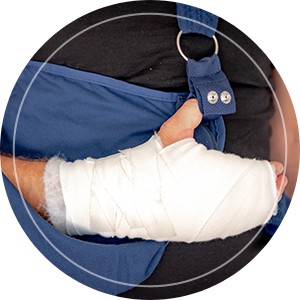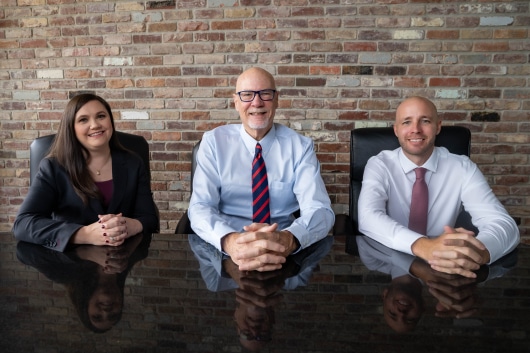
Personal Injury Lawyer FL
When you need a personal injury lawyer in Florida, you can count on Brooks Law Group to defend your rights and get you the compensation you deserve.
Personal injury lawsuits are civil actions you take against the people you believe are legally responsible for your injury.
The court will decide how much money you will receive if you can prove that the entity or individual was at fault. Compensation may include:
- Medical bills
- Lost work earnings
- Pain and suffering
When you have a skilled personal injury lawyer on your side, you may be able to settle your compensation out of court. This is why it is so important to have a qualified law firm at your side to represent you.
If you’ve been hurt in an accident, confusion about what to do next is natural – but there is hope. You might be able to get money for your losses through a personal injury lawsuit, but you need to hire a personal injury lawyer to help you.
If you live in the state of Florida, Brooks Law Group can help you with your personal injury claim.
Get in touch with us today for a free consultation!
What does a personal injury attorney do?
A personal injury attorney provides legal help to those who’ve sustained injuries as a result of the negligence of someone or something.
The offense may be committed by:
- An individual
- Company
- Government agency
- Other entity
The injuries can be caused by:
- Vehicle accidents
- Workplace injuries
- Slip and fall accidents
- Medical malpractice
- Product defects
Depending on the circumstances of your case, the attorney will determine what type of lawsuit to file. For instance, a defective product injury would require a product liability claim against the manufacturer while a medical mistake would require a medical malpractice claim, which is a civil lawsuit against your doctor.
However, these cases can be complex, and the amount of compensation will depend on the specific facts of the case. Some common types of personal injury cases include:
- Automobile accidents
- Aviation accidents
- Motorcycle accidents
- Railroad accidents
- Truck accidents
- Drunk driving cases
- Defective products
- Medical malpractice
- Negligence
- Dog attacks
- Slip and fall accidents
- Unsafe conditions
- Nursing home abuse
- Construction accidents
If you have been injured due to the negligence of another person, you may be entitled to compensation for your damages. An experienced personal injury attorney can help you file a personal injury case.
Florida Personal Injury Law Offices
Have you suffered a personal injury in Florida? Was your personal injury caused by another person or an unsafe condition at your workplace?
If you answered yes to either of these questions, then the attorneys at Brooks Law Group can represent you in a lawsuit.
Common Personal Injury Types
Personal injuries can be serious, such as a spinal or brain injury, resulting in long-term medical treatment and out-of-home placement for the victim. However, personal injuries can also be minor.
Some common types of injuries include:
Slip and fall accidents occur due to an unsafe or hazardous conditions on a property. Property owners may be responsible for accidents, resulting in medical bills, lost wages, and even chronic pain and suffering.
Car accidents are one of the most common personal injury cases. These types of accidents often result in severe injury, pain, and suffering, and victims may be entitled to compensation to cover their losses.
Defective products can cause serious injuries, and manufacturers can be held liable for resulting damages. Examples of dangerous and defective products include cars, medications, and appliances.
Medical malpractice is an inexcusable act of negligence that results in injury or harm to a patient. Injuries resulting from medical malpractice can range from long-term medical complications to wrongful death.
Workplace injuries can range from minor to catastrophic and include musculoskeletal injuries and repetitive motion injuries.

Look to Brooks!
 The first thing you should do if you are injured is seek medical attention. Next, you should speak to a personal injury attorney experienced in Personal Injury Cases in Florida about filing an injury lawsuit.
The first thing you should do if you are injured is seek medical attention. Next, you should speak to a personal injury attorney experienced in Personal Injury Cases in Florida about filing an injury lawsuit.
What is the personal injury claims process in Florida?
Filing a personal injury claim in Florida typically involves several steps in the legal process, which may vary depending on the jurisdiction and the specific circumstances of the case. Once you have an experienced attorney by your side, the general steps in filing a personal injury claim include:
- Gathering evidence: Evidence pertinent to the case should be collected, such as photos, witness statements, medical records, and any other documents pertaining to the incident.
- Filing a complaint: After the evidence is collected, a complaint is filed in court with the necessary paperwork and documents.
- Responding to a demand letter: After filing the complaint, the defendant’s insurance company may send a demand letter to the plaintiff, offering a settlement.
- Negotiating a settlement: With the help of an attorney, a settlement between the parties can be negotiated.
- Going to trial: If the parties are unable to reach an agreement, a hearing, or trial may be scheduled.
But the first step in the process is always to consult with a Florida personal injury lawyer who can review the facts of your case and advise you on the legal options available to you.
Featured Personal Injury FAQs
The personal injury case manager assigned to a client’s file works directly under the direction of the attorney assigned to the file. They work very closely with the attorney and the client to make sure that we follow through with our mission to provide the best client experience possible.
Personal injury cases are not limited to vehicle accidents. A Personal Injury case can be caused by a slip and fall, dog bites, and many more. It is important that you find an attorney with a good standing at the Florida Bar as well as exemplary recognition throughout your state (such as awards, community outreach). Once you have made your selection make a consultation appointment and don’t forget to bring all your questions.
When your case is most likely to settle?
Once you know your medical diagnosis and after you know all the responsible parties. Don’t settle before you know your medical diagnosis and the identity of all the responsible parties.
While your case can be settled at any time, the next most logical time to settle the case is before trial. Trials are expensive and juries and judges are not always predictable.
What factors can quicken the settlement time?
The ability of the defendant to pay. Ideally, defendants have insurance to pay your claim. Otherwise, they need to pay from their personal or business assets.
The ability of your uninsured/underinsured motorist (UM) coverage to pay. In motor vehicle cases, even if the other side doesn’t have enough insurance/assets to pay a claim, you can claim through your own UM policy.
Once you have determined the insurance coverages available and obtained all medical records and bills, you must set forth the reason why the insurance company should pay a reasonable amount to resolve the claim. You must establish the elements of negligence: liability, causation, and damages.
- A personal injury lawyer can handle the details.
- Injury attorneys can level the playing field.
- An experienced lawyer can prevent errors.
- Personal injury attorneys know what your case is worth.
- No fee unless you win.
Personal Injury Lawyers Serving the State of Florida

The Florida personal injury lawyers at Brooks Law Group are willing to evaluate your potential personal injury case and discuss its merits and value with you. There is no charge for our preliminary evaluation and discussion.
We will ask you to bring any medical reports or accident documentation you have, as well as contact information for the individual or company that is responsible for your injury. We stress to all our potential clients that you should speak to an attorney before speaking with an insurance adjuster.












